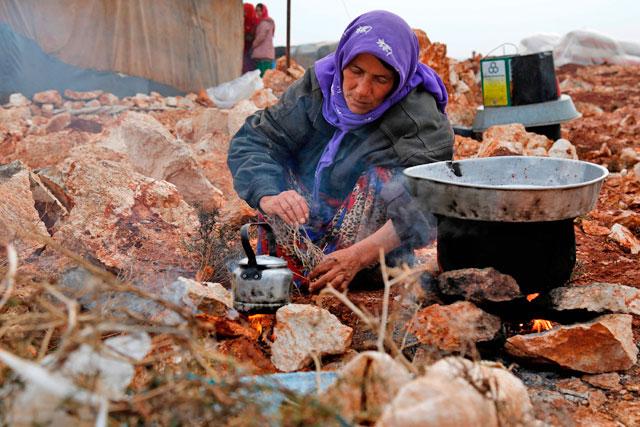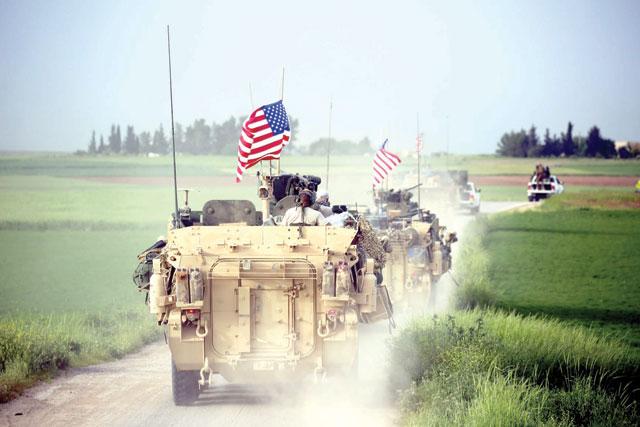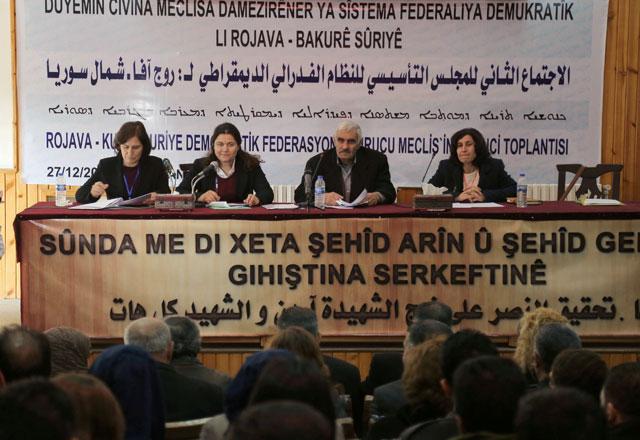You are here
Syria’s Kurds to hold historic vote in ‘message’ to Assad
By Reuters - Sep 21,2017 - Last updated at Sep 21,2017

Syrians register for the first local elections in the northeastern Syrian city of Qamishli on Tuesday, as Syrian Kurds prepare for the vote scheduled three days later in areas under their control within the framework of the federal system which was set up in March 2016 (AFP photo)
BEIRUT — Kurdish-led regions of northern Syria will hold elections on Friday, a historic expression of free will and a message to President Bashar Assad, as he seeks to reassert control over the whole country, a senior Syrian Kurdish politician said.
As Kurds in neighbouring Iraq prepare to vote on secession from Baghdad, Hadiya Yousef told Reuters that Assad's aim to take back all of Syria could lead to its partition, though Syria's Kurds insist that independence is not their aim.
The three-phase vote set to begin on Friday is part of a plan mapped out by Syrian Kurdish groups and their allies to set up a federal system of government that will shore up the autonomy they have enjoyed in the north since 2011, when Syria's civil war broke out.
The political structures expected to emerge from the process are inspired by the ideas of Abdullah Ocalan, the head of the Kurdistan Workers Party (PKK), who is in jail in Turkey for leading a three-decade insurgency. Turkey views Kurdish autonomy in northern Syria as a threat to its national security.
In Friday's election, voters will be picking leaders for some 3,700 communities, or "communes", spread across three regions of the north. The process will be followed in November by elections to local councils and culminate in January with the election of an assembly that will act as a parliament.
The Syrian government, which is regaining swathes of territory with Russian and Iranian support, opposes the plan and has repeatedly insisted that it will recover all the territory that has slipped from its grip during six years of war.
"The regime's insistence on renewing this authoritarian, centralised regime will lead to a deepening of the Syrian crisis," said Yousef, who co-chairs a constituent assembly at the heart of the plans for the new system of government.
"If [the government] insists on this position, the regime will steer Syria towards partition," she said by phone. The people of northern Syria had the means to defend themselves, she noted, and urged Damascus to accept dialogue.
‘The shadow’
of the Baath
The main Syrian Kurdish groups and their militia, the YPG, have emerged as a major force in Syria since the onset of the war, and now control approximately a quarter of the country.
Damascus and its allies on the one hand and the YPG and its allies on the other have mostly stayed out of each other's way in the war. But tensions are surfacing as the sides race to grab territory from Daesh in Deir Ezzor in eastern Syria.
The YPG is the main component of the US-backed Syrian Democratic Forces (SDF), and its area recaptured from the Daesh terror group.
Though it backs the YPG, the United States last year declared its opposition to creation of autonomous zones in Syria. It has also come out against the Iraqi Kurdish independence vote set for Monday.
Yousef said the decision to hold the elections while the people of northern Syria were simultaneously fighting Daesh reflected their determination to press ahead.
"At the same time, it is a message to the Syrian regime that we as the Syrian people have will and want our will to be represented in the election of our administration to run our regions and societies," she said.
The elections will not take place in all the areas controlled by the SDF. There will be no vote in the city of Manbij, captured from Daesh last year, for example, or in recently captured areas near the city of Raqqa, she said.
Critics say the governing structures set up so far in northern Syria are less democratic than they claim to be, and are dominated by officials committed to the PKK.
But senior Kurdish politician Al Dar Khalil said a culture of democracy was being advanced in the region, after years of oppressive Baath Party rule. "In Syria, from '63 ... we were living in the shadow of the Baath Party — one party controlling all institutions and aspects of life," he told Reuters.
"We want to change this mindset."
Related Articles
BEIRUT — Syria's main opposition group on Wednesday condemned the US-led coalition's plan to create a 30,000-strong border force on the war-
QAMISHLI, Syria — Syria's Kurds fear the steadfast ally they found in the US to successfully take on the Daesh terror group militants may no
BEIRUT — Syrian Kurdish groups and their allies are expected to approve a blueprint for a system of federal government in northern Syria thi



















